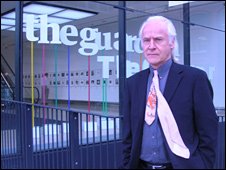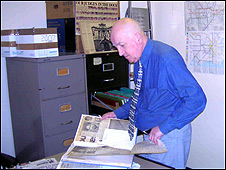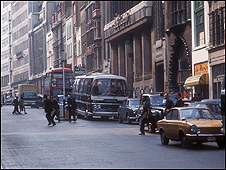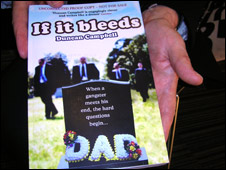Imagine a time before reality TV,
wall-to-wall celebrities, 24/7 news channels, political spin and the
public relations industry
 |
|
Celebrity gossip has forced out a lot of hard news in modern
newspapers |
Believe it or not, once upon a time,
newspapers and television news bulletins were full of actual news
involving actual people, much of it generated by reporters on the crime
beat.
The demise of the crime reporter, and
the decline of investigative journalism in general, has coincided almost
perfectly during the past 20 years with the rise of celebrity news.
Tittle-tattle about soap stars,
Premier League footballers, TV chefs and even those who "starred" in
shows like Big Brother now makes up the bulk of tabloid newspaper
content, and it has seeped inevitably into upmarket papers and TV news
and current affairs programmes.
This is a world in which the first
photograph of TV presenter Davina McCall, pregnant, walking down the
street, was sold to a newspaper for ?7,500.
Death of Fleet Street
Other factors have no doubt played a
part - the rise of public relations (PR) and press officers and the
gradual move away from Fleet Street by the national newspapers meant the
culture of journalists getting out of their offices and chatting to
detectives, lawyers, politicians, entrepreneurs and other "sources" over
a drink in a pub has ebbed away.
"Hard news is declining and there has
been a movement towards 'lifestyle journalism', often provided by PRs or
agencies. It is cheap and fairly easy," says Bob Franklin, professor of
journalism studies at Cardiff University.
He says: "I often wonder why we train
our students to cover the courts and council meetings because when they
get jobs they rarely have to do either. Journalists do not get out of
their offices as much as they used to. There is a lot more juggling the
wires [news agencies] and press releases.
 |
Newspapers don't want to run lengthy court reports.
We are playing up to an attention deficit disorder

Duncan Campbell The Guardian
|
After all, discussing the latest
celebrity
dress is easier than uncovering
corruption on a local council."
Duncan Campbell, the Guardian's
long-time crime correspondent, who is retiring this year after four
decades in journalism, says: "Nowadays you get much more homogenous news
with all the media chasing the same stories."
"Most newspapers, and the BBC and
others, have websites and they can see from the number of hits a story
gets what is popular.
"You will find a story about [Cristiano]
Ronaldo or Kate Moss will be massively hit, which you will not
necessarily get from an interesting story with nobody famous in it."
Campbell says crime coverage has been
one of the biggest casualties, with newspapers and broadcasters
massively downsizing their teams.
Retreat of the reporters
Old Bailey reporter Dave St George can
vouch for that.
"I started here in 1969 when I was
asked to supply the Telegraph, Mirror and the Standard," he says.
"In those days PA [the Press
Association] had seven people covering the Old Bailey, and the Express,
Mail and the Times all had staffers down here."
PA now has two hard-working but
over-stretched journalists covering the Old Bailey and supplying copy to
the national newspapers, who long ago withdrew their court reporters
back to their offices.
 |
 The other day there was a fellow jailed for 30 years
for shooting at a policeman. That would have been a
big story a few years ago, but nowadays it doesn't
even merit a mention
The other day there was a fellow jailed for 30 years
for shooting at a policeman. That would have been a
big story a few years ago, but nowadays it doesn't
even merit a mention

|
St George says: "I used to get four or
five stories in the Telegraph every day. Now I never hear from the
newsdesks from one year to the next. They're filling the papers with all
this other stuff.
"The other day there was a fellow
jailed for 30 years for shooting at a policeman. That would have been a
big story a few years ago, but nowadays it doesn't even merit a
mention," St George says.
The case of Carlton Sam only merited
three paragraphs in the Sun and one paragraph in the Mirror. No other
national newspaper reported it.
Ironically the reduction in coverage
coincides with a rise in the number of crimes.
"In the 1970s if we had one homicide a
fortnight it was big news," St George says.
This week there are 11 ongoing murder
trials at the Old Bailey.
So have readers just had their fill of
crime? Would they rather read about the new mansion Ronaldo has bought
or discover why an EastEnders actress has split up with her boyfriend?
Yes, says Mark Frith, former editor of
Heat magazine and author of The Celeb Diaries.
"There was an untapped market and the
whole [Princess] Diana phenomenon showed that people wanted to read
about people in the public eye," he says.
"Posh and Becks was the start of the
celebrity age and since then it has moved on to people like Jade Goody,
who was the most read story on the BBC website two days running."
 |
| Carlton
Sam, who shot at police, barely merited a mention
|
Frith says: "Editors have to decide
which stories will engage their readers and they will not mourn for
stories that they have not got room for."
A spokesman for the Daily Telegraph
told the BBC: "Our aim is to provide up-to-date, reliable news and
comment for our readers from a range of voices. We believe we have been
successful in that, including appealing to changing audiences, which is
why we remain the market-leading news provider."
Professor Justin Lewis, head of the
School of Journalism, Media and Cultural Studies at Cardiff University,
has conducted research on the changing content of newspapers.
He says: "There is no doubt that
celebrity news as a category has grown markedly, especially in
broadcasting.
"There is a perception that that is
what people want but there is not actually that much evidence that it
is. People may say it sells newspapers, but clearly it doesn't because
circulation is still going down."
But he adds: "I don't think there is a
shortage of crime coverage, but it's just a different type. Big
newsworthy crimes still get covered rather than the day-to-day business
of the courts."
TV to blame?
Jeff Edwards, who was the Mirror's
crime correspondent until being made redundant last year, agrees: "I
don't think crime reporting is dead. There is not a huge dropping off in
interest in law enforcement. But there is a dropping off in stories
about ordinary people."
Professor Franklin says there is no
doubt the courts are not covered like they used to be, but he says there
is still a big demand from the public for crime stories, especially
"cause celebres" like the cases of Madeline McCann and Shannon Matthews.
Campbell says: "Newspapers don't want
to run lengthy court reports. We are playing up to an attention deficit
disorder. There is a feeling that people can't take large chunks of
information, whether it's on radio, on television or in newspapers."
 |
| Fleet
Street has changed out of all recognition since the 1970s |
He pins part of the blame on TV.
"The concept of rolling news, where
the competition is not to explain something better but to have a version
up quicker. Speed, rather than depth, has become the essence," he says.
"Decent court reporting is also very
people-intensive. Sometimes you may have to hang around for a few days
without getting anything in the paper, but you bump into lawyers, police
officers, even defendants and somebody tells you something and you get a
story emerging."
Campbell's latest novel is a "requiem
for the old days of crime reporting" and focuses on an Old Bailey
reporter struggling with a celebrity-obsessed newsdesk.
He sees the same trends in local
newspapers, where cut-backs have meant it is extremely rare to see
journalists at most magistrates' and even crown courts.
But one place where crime reporting
thrives is Scotland, where tabloid papers regularly lead with tales of
organised crime.
The editor of the Sunday Mail, Allan
Rennie, says: "I don't know if it's because Scots like crime stories or
whether organised crime is more visible up here, more like old-fashioned
criminals like the Krays."
Rennie adds: "Nowadays it's a fact of
life that you can't afford to send staff to spend days on end at court."
He thinks one possible answer would be
to allow television cameras inside courts.
Changing media
 |
| In
Duncan Campbell's book a court reporter battles with his
newsdesk |
The media has changed enormously since
the 1970s.
Reporters are now equipped with mobile
phones, laptops, Blackberrys and digital cameras and can file copy much
quicker than in the old days.
The general public are often invited
to become "citizen journalists" by e-mailing or texting in photographs
or reportage of incidents they have witnessed, including pictures of
celebs doing embarrassing or even mundane things.
But citizen journalists cannot cover
court cases - they are not trained in the legal pitfalls and are
unlikely to have any shorthand skills - so the criminal justice system
goes under-reported.
Who cares?
But does it matter?
Professor Lewis says: "The danger is
that it potentially distorts our perception of crime."
St George says there is another
danger.
"Princes and paupers and politicians
can get away with murder if there is nobody on the press bench to report
it," he says.
"And if an accused wants to declare
their innocence to the world who is there to report it?"
Campbell says: "Who knows how many
scandals we have missed? People might have got away with a lot of stuff
because there are far less investigative journalists going out and
actually covering things. It's far easier to shove a celebrity picture
on a page rather than go out and find a story."
But he is hopeful for the future.
He says: "There may be a reaction to
the trivialisation of the news, to the spin and the vitriol, in ways I
can't predict. We are in a period of enormous change and people may want
to know about stories in far greater detail."
If It Bleeds, by Duncan
Campbell, is due out this week. |







